|
|
This topic comprises 2 pages: 1 2
|
|
Author
|
Topic: Smoke In The Screening Room
|
|
|
|
|
|
|
|
|
|
|
Mark Gulbrandsen
Resident Trollmaster

Posts: 16657
From: Music City
Registered: Jun 99
|
 posted 11-17-2018 03:15 PM
posted 11-17-2018 03:15 PM




https://www.cnn.com/2018/11/16/health/san-francisco-wildfires-air-quality-worst-in-world/index.html
Schools, colleges and public transit have closed as smoke from the Camp Fire descends on the region.
"It appears to be the worst air quality ever experienced in San Francisco," said Dan Jaffe, a professor of environmental chemistry at the University of Washington. He called the situation "an air quality emergency," and experts said the smoke could undo decades of progress on pollution.
"We have made tremendous efforts and investment to clean up our air with considerable benefits for public health," said Dr. Daniel Jacob, a professor of atmospheric chemistry and environmental engineering at Harvard University. "But now it's like we're getting stabbed in the back with those wildfires."
Some call cancellations 'too little, too late'
San Francisco's transit agency has taken its cable cars off the streets, several schools have canceled classes, and the National Park service suspended tours to Alcatraz Island.
Public schools in San Francisco and Alameda County were closed Friday, along with UC Davis and UC Merced. UC Berkeley also canceled Friday's classes, but some students criticized the university's decision to stay open Thursday as smoke descended on the campus.
The school's student association wrote a letter to their chancellor denouncing the "administration's insufficient response to these public health risks" and urging administrators to allocate emergency funds for masks and mobile air filtration units.
"Campus buildings are not equipped to filter out the pollutants making the air indoors just as harmful as it is outside," the group wrote. Some students, even those without pre-existing conditions, said they felt sick.
"I had a bloody throat, bloody nose, a cough, dry and watering eyes, and my throat is still very sore and dry," freshman Sabrina Thorn said. "I almost passed out trying to go to class yesterday. My professor told me to go home."
Students struggle to find respirators
Thorn's sorority sister gave her a mask, but freshman Samantha Greene said that other students have struggled to find them. That's because the university's health service is not distributing them to all students -- just those with medical conditions like asthma.
"There are over 40,000 students at the university," spokesman Dan Mogulof said, "and we just don't have access to masks of that number."
Some students, though, still think the school needs to be doing more.
Students at the University of California, Berkeley wait for respirators distributed by a student-led organization Thursday.
Students at the University of California, Berkeley wait for respirators distributed by a student-led organization Thursday.
"I have many friends who have been coughing up blood and [were] forced to seek emergency medical help because of the air and Berkeley's unwillingness to act," Greene said.
The student association itself decided to hand out masks Thursday, she said, leading to large crowds as people "desperately [tried] to get respirators from [the] student-run club, which ran out in the first five minutes and turned into a mob scene."
In stores near Berkeley, masks also quickly sold out, Greene said, leading to "an absurd sort of competition between students to get one." Students lucky enough to get the masks, she said, were trying to sell them at "absurd prices."
In a message to students announcing Friday's cancellation, the school's chancellor, Carol Christ, said Thursday that Berkeley had "a limited supply of appropriate 'N-95' respirators available for those students with medical conditions that may make them particularly susceptible to the impact of degraded air quality."
Greene called that "too little too late" and said masks are still difficult to come by. The university told students that "even these relatively advanced masks provide limited protection and are not a substitute for staying indoors."
Jaffe, however, said that "the masks definitely help" if worn properly and are "better than nothing," although staying in a building with filtered air offers the best protection.
The university, for its part, says it's doing the best it can. "Our students, like our staff, our faculty and our neighbors, are without a doubt being impacted by one of the greatest natural disasters in California's history," Mogulof said. "The university just does not have the ability to completely mitigate the impacts of this wildfire."
Particulate matter is the "number one environmental killer in the world," Jacob said, and "the levels that are present in those areas affected by wildfires are like you might expect on a very polluted day in China or India."
Smoke from fires releases particles small enough to make their way through our nose and into our lungs, Jaffe added, and "young children and the elderly have the greatest risks for immediate health concerns."
PM can aggravate asthma, decrease lung function and increase the risk of cardiovascular events such as stroke, according to a study published last year in the Lancet. And because children with developing airways breathe more air per pound of body weight than adults, they can experience more severe symptoms.
"We give people advice to say indoors and to reduce exercise and things like that," Jaffe said, "but those don't mitigate the problem too much." That's especially true in San Francisco, where many don't have air conditioning.
| IP: Logged
|
|
Jim Cassedy
Phenomenal Film Handler

Posts: 1661
From: San Francisco, CA
Registered: Dec 2006
|
 posted 11-18-2018 10:19 AM
posted 11-18-2018 10:19 AM




quote: James Wyrembelski
we've had terrific sunsets over lake Superior due to fires in the western states.
This was taken abt 4pm on Thurs
from the roof of my apartment.
Normally you'd also be able to see
the ocean at the bottom of the picture,
but not last week!
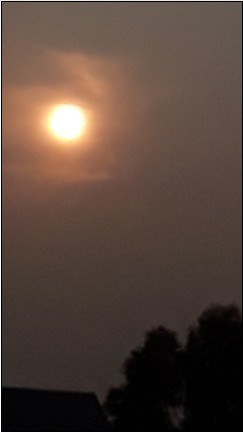
(And this is SMOKE, not fog- -
I've lived in SF long enough
to know fog when I see it! LoL)
quote: Marcel Birgelen
You don't really want your screening room to smell like a BBQ smokehouse.
What??? I don't smell anything.....

Mark's article was pretty informative and pretty much sums up the bad
air quality situation here in San Francisco. (and it give s whole new
meaning to the phrase "I'm going outside for a smoke!" )
Many businesses were closed on Friday, & a lot of schools and
universities started their Thanksgiving holiday recess early.
They've even shut down the cable car system! This
is the famous end-of-the line cable car turnaround
at Powell Street, and as you can see, there isn't a
cable car (or any tourists!) in sight.
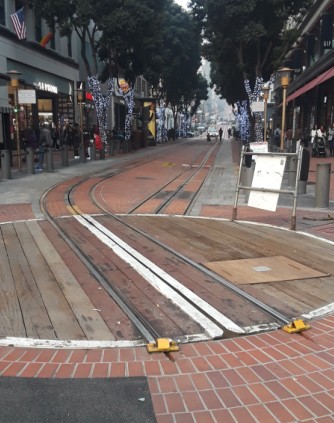
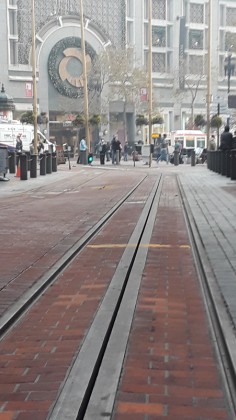
Of course, all of this is just a minor inconvenience
here, compared to the hundreds of people who lost
everything, or even their lives, in the fires. ![[Frown]](frown.gif)
| IP: Logged
|
|
|
|
Bobby Henderson
"Ask me about Trajan."

Posts: 10973
From: Lawton, OK, USA
Registered: Apr 2001
|
 posted 11-18-2018 04:53 PM
posted 11-18-2018 04:53 PM




quote: cnn news article
The school's student association wrote a letter to their chancellor denouncing the "administration's insufficient response to these public health risks" and urging administrators to allocate emergency funds for masks and mobile air filtration units. "Campus buildings are not equipped to filter out the pollutants making the air indoors just as harmful as it is outside," the group wrote. Some students, even those without pre-existing conditions, said they felt sick. "I had a bloody throat, bloody nose, a cough, dry and watering eyes, and my throat is still very sore and dry," freshman Sabrina Thorn said. "I almost passed out trying to go to class yesterday. My professor told me to go home."
That sounds pretty rough. But at the same time the Bay Area has millions of other people, some of whom are far less fortunate than students attending an elite (and expensive to attend) university in a community whose living costs are among the highest in the nation (if not the world). What about those people? Anyone getting breathing masks or air filtration systems for them?
What about the thousands of newly homeless people stuck much closer to the Camp Fire? They're living in tents or their cars situated in Walmart parking lots or any other place that might allow them to take temporary refuge. Those people aren't nearly as well off as students at Berkeley. They've lost just about everything they own in the fires and to top it off the rampant, price-gouging douche-baggery across California has made it just about impossible for these victims to find affordable housing elsewhere in the state.
I don't know. IIRC Berkeley is a public university at least partially funded by taxpayer dollars. The tone of the article made it sound like the student association expected the university to either already have a stockpile of breathing masks and other stuff on hand for a disaster of this scale or go out buy a bunch of it instantly like magic. Possibly with taxpayer dollars. The article made the students sound a bit entitled and overlooked other people more vulnerable to bad air quality than college students.
quote: cnn news article
In stores near Berkeley, masks also quickly sold out, Greene said, leading to "an absurd sort of competition between students to get one." Students lucky enough to get the masks, she said, were trying to sell them at "absurd prices."
Like I said, rampant douche-baggery.
Maybe the students can order some masks off Amazon and have Jeff Bezos deliver them in a swarm of drones.
| IP: Logged
|
|
Leo Enticknap
Film God

Posts: 7474
From: Loma Linda, CA
Registered: Jul 2000
|
 posted 11-18-2018 08:38 PM
posted 11-18-2018 08:38 PM





Agreed with Bobby. It reminds me of an incident when I was a teenager growing up in London. During one brutally cold winter, the commuter railroad system serving the London suburbs pretty much ground to a halt, resulting in howls of protest from the train drivers' union, passengers representatives, and anyone else who wanted to jump on the gravy train (pun irresistible), calling for the public execution of everyone involved in managing the rail system.
In a now infamous press conference, the chief exec went on the TV blaming "the wrong kind of snow" for the chaos. Sweden and Norway have this sort of weather all the time and they don't let it bugger up the trains, screamed the press, so why is London incapable of dealing with it?
The reason, of course, is that because Sweden and Norway have snow all the time, they spent bazillions on the infrastructure needed to make their railways snowproof. If British Rail had spent those bazillions, they would have got a very poor return on the investment, because the infrastructure would only have been needed for a few days every twenty years or so.
The same applies here - attacking UC Berkeley for not being prepared to protect their students from the effects of a smog that only happens once or twice a century is unrealistic.
| IP: Logged
|
|
|
|
Marcel Birgelen
Film God
Posts: 3357
From: Maastricht, Limburg, Netherlands
Registered: Feb 2012
|
 posted 11-19-2018 03:55 AM
posted 11-19-2018 03:55 AM




It's seemingly part of human nature to complain about everything and people seemingly expect that all eventualities, how minor their chance of happening, are accounted for.
I still remember a quite a few years back, when the Icelandic volcano named Eyjafjallajökull (try to pronounce that one) erupted and essentially grounded all air traffic in large parts of Europe. Given on just how many people nowadays rely on cheap flights, this caused a major havoc. On the other hand, it helped me to convince people that you can perfectly do meetings using "modern" tools like video conferencing.
All kinds of stupid people made the news back then, including those who demanded airlines and aircraft manufacturers to invest in planes, capable of flying though volcanic ash clouds...
quote:
They've even shut down the cable car system!
What's the reasoning behind this? The lack of tourists? The health of the cable car drivers?
I'm actually always wondering, if there any locals that rely on the system or if it's really just a tourist attraction those days.
quote: Bobby Henderson
They've lost just about everything they own in the fires and to top it off the rampant, price-gouging douche-baggery across California has made it just about impossible for these victims to find affordable housing elsewhere in the state.
Since it hit American people on American soil, I guess you should be able to motivate a bit of national fundraising and get people and businesses to show a bit of euhm.... nationalism?
I still remember the last time the Netherlands was hit by a big flooding incident more than 20 years ago, where multiple rivers carried record high waters and lead to the flooding and destruction of many homes in the South-East. The national fundraising action collected almost as much money as the total insurance claims afterwards.
People that did not get compensated by their insurance, got most of their damage refunded using the national emergency fund, combined with the money raised. Although obviously people still lost a lot, including a lot of stuff that cannot just be compensated with money, nobody ended up being homeless. People that lost their homes and couldn't stay elsewhere weren't put into camps or tents, but in hotels, holiday resorts or temporary housing. Now, having somewhat of a Dutch background (I'm just living there ![[Smile]](smile.gif) ), I'm not proud of what we achieved, a lot of stuff could've even have done better. But at the least, we didn't let those people just sit in their own shit, we did what you can expect from civilized people. ), I'm not proud of what we achieved, a lot of stuff could've even have done better. But at the least, we didn't let those people just sit in their own shit, we did what you can expect from civilized people.
Without getting borderline political, I still don't understand how a rich country and a rich state like California can let this happen. Why do those people need to stay in temporary encampments so close to the fires? There are plenty of hotels or other decent places they could stay. Those hotels could help a hand by not milking the situation and you'd expect either the National government or California to have an emergency fund to pay for it?
| IP: Logged
|
|
|
|
Leo Enticknap
Film God

Posts: 7474
From: Loma Linda, CA
Registered: Jul 2000
|
 posted 11-19-2018 07:55 AM
posted 11-19-2018 07:55 AM





quote: Marcel Birgelen
I still remember a quite a few years back, when the Icelandic volcano named Eyjafjallajökull (try to pronounce that one)...
I was in California when that happened (but had not actually emigrated there by that point), and due to fly back to what was then home (north-east England) two days later. I remember whiling away a morning in limbo listening to Rush Limbaugh attempting to pronounce it: "Eyf.... Eyf...... oh, darn it, I can never do these foreign names. It sounds like I f*** a golf ball!"
I eventually got back across the Atlantic on the day transatlantic flights restarted. I almost had an A330 to myself from Portland (OR) to Amsterdam. I've never been on such an empty plane: they upgraded everyone, because there were only about 10 passengers. Permission to start flying again happened so quickly that almost no-one waiting to travel was able to get to the airport and through security in time. Delta wanted the plane in Europe ASAP, in order to start getting stranded Americans home.
The fun started in Amsterdam, though - KLM's short haul network was still paralyzed, so I was given the choice of waiting at least three more days, or finding my own way back. That consisted of a 20-hour boat ride from Amsterdam to Newcastle, in the company of a very rough North Sea and about 200 drunk Geordies returning from a weekend that appeared to have been spent acquiring the mother of all hangovers.
But yes, that is a classic illustration of how, occasionally, things happen that hit the limits of what you can plan to mitigate, and when it does, you just have to make the best of it that you can. I understand that this incident resulted in a lot of knowledge being developed as to what the safe levels of volcanic ash in the atmosphere for different engine types at different altitudes are, and that if the same thing were to happen tomorrow, the disruption would be a lot less severe as a result.
quote: Marcel Birgelen
Without getting borderline political, I still don't understand how a rich country and a rich state like California can let this happen. Why do those people need to stay in temporary encampments so close to the fires?
A lot of people don't want to leave the area, because although their homes are gone, they still have their jobs, and need to keep them. The same thing happened with the other big fires in the last couple of years.
And while there is hotel capacity, it is finite. The hotel industry does not try to keep a lot of empty room capacity available year-round, for obvious reasons.
quote: Marcel Birgelen
...and you'd expect either the National government or California to have an emergency fund to pay for it?
It's difficult to explore that one without getting political, not least because a political dispute already exists as to what the relative responsibilities of the state and federal governments are in this case, and why.
One issue that really will need to be looked at, though, is that of insurance. Already, it is effectively nonexistent for earthquakes. My wife and I got a quote when we moved into our current home: $2,200 a year for earthquake coverage, with a $20k deductible for any claims. A quick look online revealed that 99.8% of insurance claims for earthquake damage are below $20k. So the overwhelming odds are that our insurance would be no insurance at all. Statistically, I am three times more likely to drop dead from a heart attack tomorrow than our home is to sustain more than $20k of damage in an earthquake.
California has lots of earthquakes, almost none of which are the sort that has Charlton Heston prowling through apocalyptic ruins, clutching his .44 Magnum in one hand and a glamorous blonde in the other afterwards. Most result in a few dozen properties sustaining damage in the high four to low five figures. A Charlton Heston-scale earthquake is about the only thing that one of these policies would be any use for.
I can see the same thing happening for wildfire insurance, too. Insurers will simply walk away from covering it, or charge so much that almost no-one can afford it, and the few who can will conclude that it is a lousy deal. I've read reports that property prices in Paradise were way below the average for that region. It was well known that the place was a fire trap and it was widely feared that eventually, what has happened would happen. I wouldn't be surprised, therefore, if we later discover that a significant proportion of the damaged and destroyed homes were not insured for wildfire damage.
Things could get to the point at which either there has to be a taxpayer-funded and (at least partially) state run program for fire insurance, or the higher risk rural areas are going to depopulate.
| IP: Logged
|
|
Bobby Henderson
"Ask me about Trajan."

Posts: 10973
From: Lawton, OK, USA
Registered: Apr 2001
|
 posted 11-19-2018 02:26 PM
posted 11-19-2018 02:26 PM




quote: Marcel Birgelen
Since it hit American people on American soil, I guess you should be able to motivate a bit of national fundraising and get people and businesses to show a bit of euhm.... nationalism?
This country has a lot of what I call fake patriotism frequently put on display, often by fair weather patriots. It doesn't cost any time, work or money to wave a flag or say things like, "I support the troops!" The gestures might make people feel good, but in the end it's just lip service. When it comes to actually offering one's time, elbow grease or money a bunch of those fair weather patriots disappear.
Disaster victims also have to be the right kind of people to attract any real help. People in different regions of the United States often don't like each other. There is a lot of resentment traded back and forth between people in coastal states versus those in "flyover country." The same back and forth resentment exists between California residents and people outside the state.
quote: Marcel Birgelen
Without getting borderline political, I still don't understand how a rich country and a rich state like California can let this happen. Why do those people need to stay in temporary encampments so close to the fires?
Some of these people are hoping to re-build their homes and businesses. Some have an emotional attachment to the place and don't want to leave. If you look at the town of Paradise in Google Street View it looked like a pretty nice mountain town. A bunch of Paradise residents are just stuck and can't go elsewhere. It was not a high income location. Many of the town's residents were retired. It costs money to drive somewhere else. If a fire victim was going to hit the road he would still need to have a specific, practical destination in mind. Expecting to start over in the nearest cities is a no-go since it's too damned expensive.
That gets back to the question, "how can a rich country and a rich state like California let this happen?" I assume that is a rhetorical question. After all isn't it obvious?
Lots of people in this nation are willing to do all sorts of unethical things to make money. One of the games is artificially running up the cost of housing in major cities in very absurd ways. Some hedge fund buys a rent-controlled apartment building or housing project tower to convert it into luxury condominiums. They use means both legal and illegal to kick out the old folks and riff raff to make room for high income tenants. Gentrification can make a neighborhood look really nice, but it comes at a cost. The homeless population has exploded in cities like Los Angeles, New York and even the Bay Area. I think it's absurd that New York City now has a homeless working class, people who work full time yet live in shelters or on the street. One would think at some point this obviously unsustainable real estate bubble would burst. The bubble is being helped out by the influx of younger adults leaving behind smaller towns, which are dealing with their own structural problems: aging/declining tax base, under-funded public schools, fewer good jobs, lower wages and (putting it bluntly) fewer good opportunities to find a spouse or just to get laid.
To go along with fake patriotism, we have a very strong winners versus losers ethic in American culture. Right now the burned out residents of Paradise are getting plenty of "thoughts and prayers" while the news coverage lasts. Months or years later these residents are still going to be recovering (or trying to recover) from this disaster. The rest of the country will have long since moved on.
Anyway, quite a few of the people affected by the fire are stuck in a very difficult position. It may be years before Paradise, CA can recover substantially enough to function as a town. Can those residents wait that long? Or will they be forced to move somewhere else, possibly somewhere hundreds or thousands of miles away?
quote: Leo Enticknap
I can see the same thing happening for wildfire insurance, too. Insurers will simply walk away from covering it, or charge so much that almost no-one can afford it, and the few who can will conclude that it is a lousy deal. I've read reports that property prices in Paradise were way below the average for that region. It was well known that the place was a fire trap and it was widely feared that eventually, what has happened would happen. I wouldn't be surprised, therefore, if we later discover that a significant proportion of the damaged and destroyed homes were not insured for wildfire damage.
The same thing has played itself out over and over again with flood insurance. When a hurricane hits the coast or there's a major inland flood from a river over-flowing its banks there's always a lot of homes destroyed that are not covered by flood insurance. Such coverage is pretty expensive. Sometimes residents won't know they bought a new home in a potential flood zone until after the disaster hits. They didn't know they needed the insurance until they had to have it. There's a bunch of people in Houston who fell in that camp when Hurricane Harvey hit last year, unleashing catastrophic flooding. Too much money was changing hands in these housing developments to worry about details.
We just have to remember insurance companies are businesses. They're in it to make a profit. Providing coverage is a secondary concern. It doesn't matter what type of insurance it is either, even health insurance. There's money to be made in making premiums very expensive and denying claims.
| IP: Logged
|
|
|
|
All times are Central (GMT -6:00)
|
This topic comprises 2 pages: 1 2
|
Powered by Infopop Corporation
UBB.classicTM
6.3.1.2
The Film-Tech Forums are designed for various members related to the cinema industry to express their opinions, viewpoints and testimonials on various products, services and events based upon speculation, personal knowledge and factual information through use, therefore all views represented here allow no liability upon the publishers of this web site and the owners of said views assume no liability for any ill will resulting from these postings. The posts made here are for educational as well as entertainment purposes and as such anyone viewing this portion of the website must accept these views as statements of the author of that opinion
and agrees to release the authors from any and all liability.
|

 Home
Home
 Products
Products
 Store
Store
 Forum
Forum
 Warehouse
Warehouse
 Contact Us
Contact Us




 Printer-friendly view of this topic
Printer-friendly view of this topic






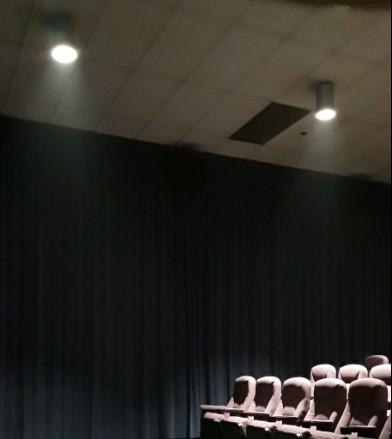
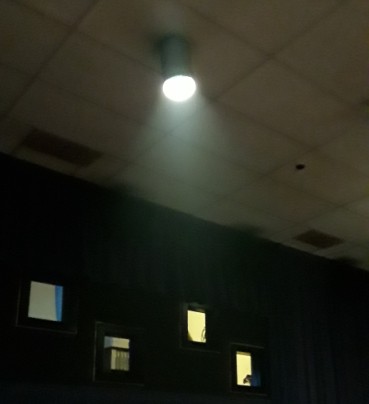
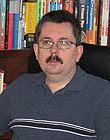








![[Frown]](frown.gif)


![[Smile]](smile.gif) ), I'm not proud of what we achieved, a lot of stuff could've even have done better. But at the least, we didn't let those people just sit in their own shit, we did what you can expect from civilized people.
), I'm not proud of what we achieved, a lot of stuff could've even have done better. But at the least, we didn't let those people just sit in their own shit, we did what you can expect from civilized people.


